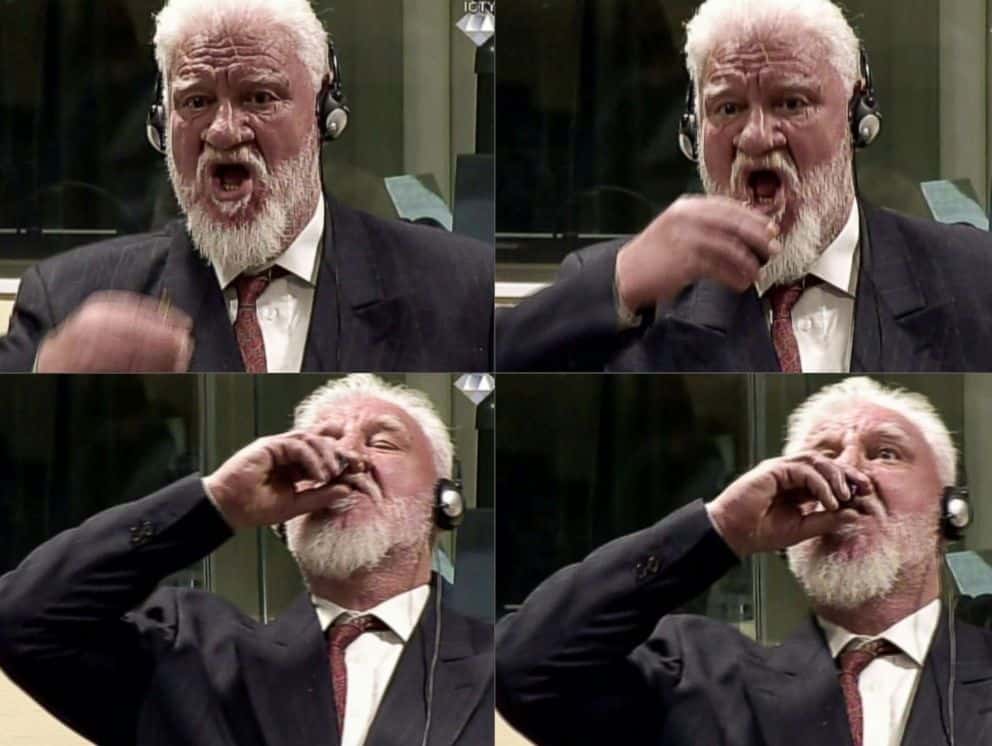FEATURED STORIES, WORLD
War Crimes Convict Dies After Taking ‘Poison’ In U.N. Court

Slobodan Praljak a former Bosnian Croat military commander drinking what appears to be poison in court
Slobodan Praljak, a former Bosnian Croat military commander, swallowed what he claimed was poison in a U.N. war crimes courtroom at the Hague on Wednesday. He died shortly after losing an appeal against his 20-year prison sentence.
The footage of the apparent courtroom suicide, which was broadcast on a video feed showed the 72-year-old drinking from a flask or glass in the final minutes of the last judgment at the International Criminal Tribunal for the Former Yugoslavia. The tribunal is set to close next month after 24 years.
“Slobodan Praljak is not a war criminal. I am rejecting your verdict with contempt,” he shouted before swallowing the liquid. After gulping down the drink, he sat back down and slumped in his chair, said a lawyer who was in the courtroom at the time of the incident. Carmel Agius, the Presiding Judge, quickly suspended the hearings and the courtroom was declared a crime scene by Dutch authorities. As a forensic investigation got underway, the chamber was sealed off and the public told to leave.
“Praljak drank a liquid in court and quickly fell ill,” Golcevski said. He was treated by tribunal medical staff, but “passed away today at the HMC hospital in The Hague,” he said.
“Don’t take away the glass!” Agius said, instructing the guards to lower blinds and block a glass-partition separating the court from the public.
Croatian Prime Minister Andrej Plenkovic, whose country was the patron of separatist Croat forces in Bosnia’s 1992-95 war, said he regretted Praljak’s death and offered condolences to his family. “His act tells the most about deep ethical injustice toward the six Bosnian Croats and the Croatian people.”
The ICTY upheld Praljak’s conviction of alleged crimes against humanity involving: persecution, murders, and expulsions of Bosnian Muslims from territories captured by nationalist Bosnian Croats as well as the brutal imprisonment of 1,000 Muslims.
In the southern Bosnian town of Mostar, where Bosnian Croats and Muslims fought each other in the war and now co-exist in an uneasy peace, cafes closed to avoid incidents.
Praljak was acquitted of some charges related to the Bosnian Croat militia’s shelling of Mostar’s iconic, Ottoman-era Old Bridge because the judges ruled that it had been a legitimate military target.
Additionally, the CTY upheld the convictions of Jadranko Prlic, former political leader of the breakaway Bosnian Croat statelet during the war, along with military and police figures Bruno Stojic, Milivoj Petrovic, Valentin Coric and Berislav Pusic.
Judges ruled there had been a criminal conspiracy, with the involvement of Croatia’s government under then-President Franjo Tudjman – who died in 1999 – aimed at the “ethnic cleansing of the Muslim population” of parts of Bosnia to cement Croat domination there.
The defendants on Wednesday received sentences ranging from 10 to 25 years. The decision cannot be appealed.
The chairman of post-war Bosnia’s shaky, Muslim-Serb-Croat presidency, Dragan Covic, a Croat, said: “(Praljak) showed before the whole world what kind of sacrifice he is ready to make to prove that he is not a war criminal.”
Previously, two defendants awaiting their ICTY trial, both Serbs, committed suicide by hanging themselves in their U.N. cells, according to court documents. Slavko Dogmanovic died in 1998, and Milan Babic was found dead in his locked cell in 2006.
The ICTY indicted 161 suspects in all from Bosnia, Croatia, Serbia, Montenegro and Kosovo in connection with atrocities in the ethnic wars there during the 1990s. Of the 83 convicted, more than 60 of them were ethnic Serbs.
The court’s lead suspect, former Yugoslav and Serbian President Slobodan Milosevic, died of a heart attack in March 2006 months before a ruling in his genocide trial.
Last week, former Bosnian Serb military commander Ratko Mladic was convicted of genocide, war crimes and crimes against humanity for mass killings and expulsions of Muslims and the siege of Sarajevo, and sentenced to life in prison.
Mladic’s lawyers tried to delay the verdict mid-reading by saying he was too ill to continue, and Mladic was then removed from the courtroom after shouting that judges were “liars”.


